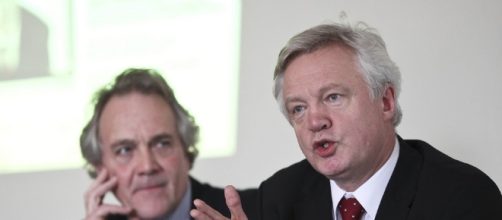Brexit Secretary David Davis is considering bypassing negotiations with the European Commission and speak directly to EU leaders.
With Brussels dismissing Mr. Davis's argument that trade should be discussed before Ireland, EU citizens' rights and the divorce bill, he hopes to talk directly to German Chancellor Angela Merkel and French President Emmanuel Macron about a free trade deal.
Downing Street has confirmed that they hope to receive a warmer reception about this issue from the French and German leaders.
Not good enough
The move comes after the President of the European Commission, Jean-Claude Juncker, and the EU's Chief Negotiator, Michel Barnier, both dismissed the UK's approach to the negotiations.
Mr. Juncker lambasted Mr. Davis's Brexit papers which aimed to clarify what Britain's relationship with the trading bloc will look like after it has left, which the Commission's President said "were not good enough." Mr. Barnier urged the UK to start approaching these discussions "more seriously."
Brussels officials have watered down Mr. Davis's suggestion to go directly to the EU member states' leaders, saying each of them would abstain from separate negotiations. The European Council has said that the UK cannot discuss matters pertaining to its exit from the trading bloc with individual members.
The French Government issued a statement saying it supports Mr. Barnier's negotiating strategy.
Flexibility and imagination
The latest round of negotiations are due to begin this week. They are set to focus on the Irish border, EU citizens' rights and the exit bill.
Mr. Davis called for "flexibility and imagination" from both sides and said that his final goal has not changed, which is a relationship between Britain and the EU that works for both of them. He defended the Brexit Department's negotiating papers, saying they are the result of hard work behind the scenes.
In a further blow to the Brexit Secretary, Guy Verhofstadt, the EU's Brexit negotiator, said that any transitional deal must reflect Britain's membership of the trading bloc. He said there is not enough time to discuss a unique deal that applies to the UK.
He told the European Parliament that it is the British Government's dithering approach to the negotiations that has caused this situation.
A transitional deal is necessary
Mr. Verhofstadt dismissed claims that Prime Minister Theresa May was willing to walk away from the negotiations, saying a transitional deal is necessary to prevent disruption to businesses. This would mean the jurisdiction of the European Court of Justice and the free movement of workers would still apply for another three years after March 2019.
The Brexit negotiator also blamed Britain's refusal to agree on a final divorce bill for the delay in discussing trade. He revealed that plans to settle the issue of EU citizens' rights was being presented to the European Parliament in October.
The former Belgian prime minister said the jurisdiction of the ECJ should still apply to EU citizens after March 2019.
Mrs May has insisted that the free movement of workers and the ECJ's supremacy over British laws should end on the day Britain leaves the EU. She wants the UK to preserve its access to the Single Market for three years after March 2019. Many European politicians fear this would mean providing former members with privileged access.
Julian Jessop, chief economist at the Institute of Economic Affairs, told CNBC that the EU were the ones holding up talks. He said it is easier said than done in relation to both sides showing more flexibility and imagination.
Mr. Jessop said the UK would have a lot to lose in the short-term if talks break down, but he said Brussels should show more flexibility instead of being excessively bureaucratic.
The economist said that whilst he sympathises with the EU negotiators, the trading bloc is negotiating on behalf of 27 other nations who created a rigid framework for how they intend to approach the talks.

